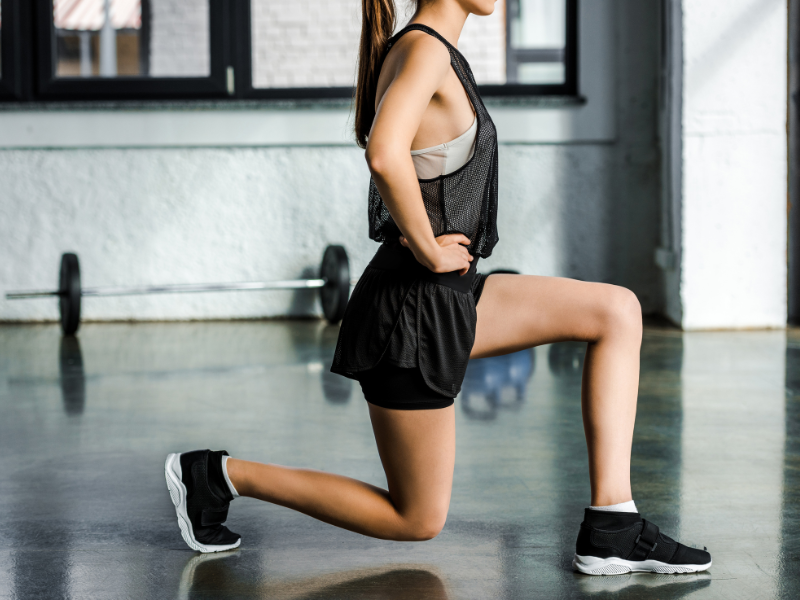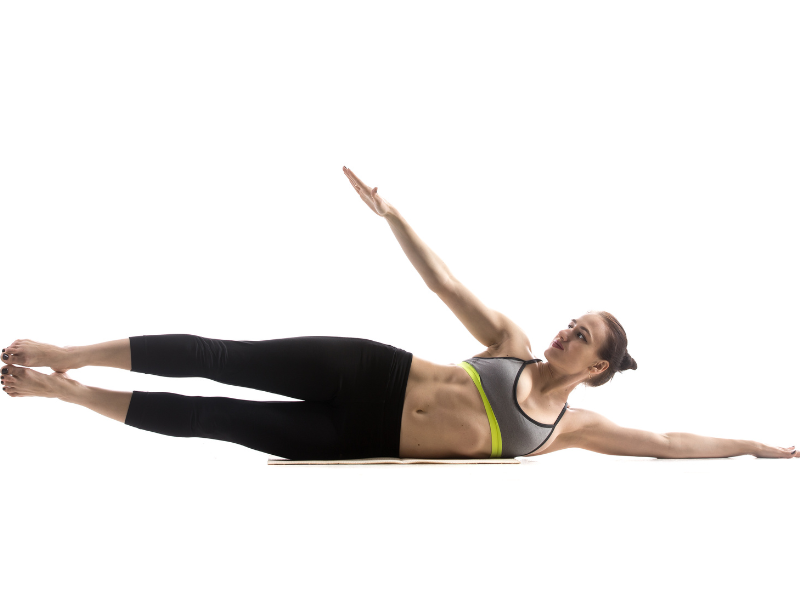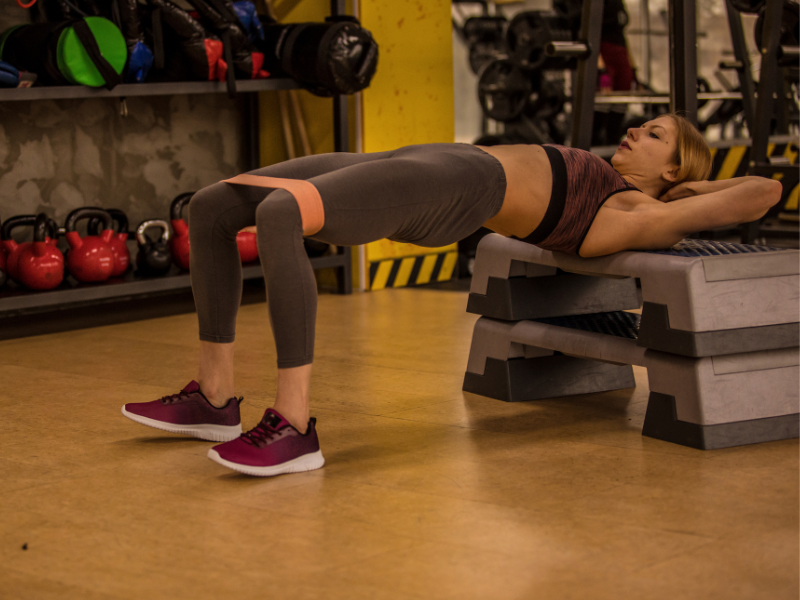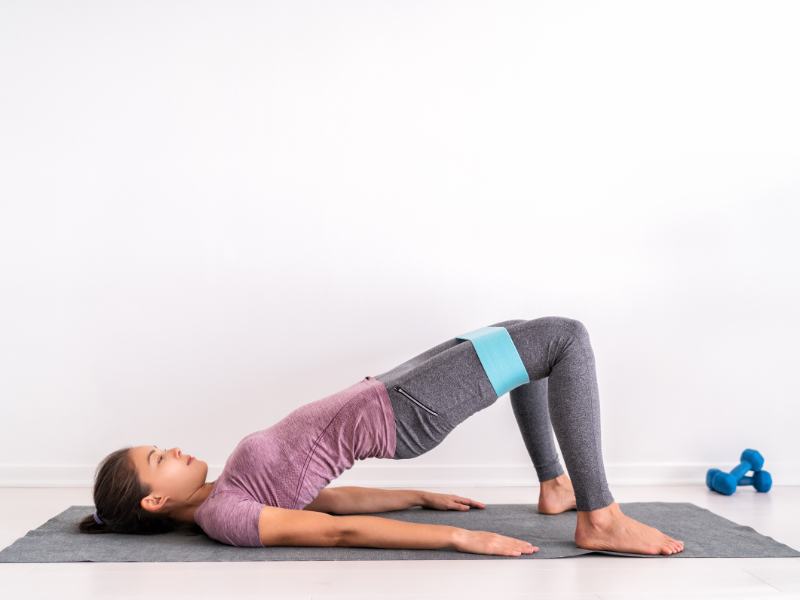




Signs To Tell Your Glutes Are Growing
1. Your clothes fit differently, specifically pants
Do your jeans feel extra snug when you try them on? An increase in muscle mass, particularly in the glutes, can cause clothes to fit differently. Anything that you wear below your waist like shorts, skirts, etc. will start to feel a little tighter around the glutes as they gain more muscles. Own your new look and update your wardrobe if you need to!
2. You have a better posture
Yet another change that will boost your confidence level – a difference in the way you carry yourself. As your glutes grow stronger, you’ll likely notice a significant decrease in fatigue from standing, and slouching will become less common. This is because stronger glutes help counteract the negative effects of tight hip flexors, which can weaken the glutes and impact your posture. Everyday activities like running, carrying objects, and even walking will start to feel easier as your improved posture enhances your overall comfort and ease.
3. Before & after photos
Before you start your journey with glute workouts, it’s important to document your progress. While you might not see significant changes in pictures taken just a few days apart, capturing your starting point will help you track visible differences over time. To get started, check out this video on how to take effective before-and-after photos for your fitness journey.
4. Measurements
If you’re looking for concrete evidence of the changes your body is experiencing during your glute growth journey, taking measurements can provide clear proof. Beginners often see quicker changes in hip circumference, typically increasing by about 1 cm every 2 months. More advanced lifters, however, may experience a slower rate of growth, around 1 cm every 2 months [2]. To accurately track your progress, it’s recommended to measure your hip circumference before you start your glute workout journey and then continue measuring every 4 weeks thereafter.

5. Easier Glute Exercise
If you find it increasingly easier to complete your glute exercises, such as squats and glute bridges, it’s a positive indication that your gluteal muscles and muscle fibers are strengthening due to the physiological changes from exercise.
6. Less fatigue during workouts
Those workouts can be tough on your body, but rest assured, they will be well worth the effort! As your muscle strength improves in the targeted areas, you’ll notice that lifting weights will start to cause less discomfort, muscle soreness, and fatigue. This is because your body adapts quickly to the increased demands, allowing you to gradually intensify your workouts as you experience less exhaustion.
7. Better stability and balance
When the foundations of your body are stronger, it’s natural to experience improved stability and balance. Stronger glutes, particularly the glute medius, play a key role in propelling you forward or upward, which enhances your coordination and balance for activities like running, jumping, and more. Additionally, you’ll notice greater stability in the lower half of your body during exercises such as Bulgarian split squats.
8. With muscle mass increasing, thigh change and waist looks smaller
As your glutes grow, you’ll definitely notice changes in your upper legs as they gain more muscle, which indicates that your glutes are also expanding. One of the effects of larger glutes is that your waist will naturally appear smaller in comparison. So, along with achieving your dream butt, you might also see a slight hourglass figure emerging.
Understanding Glute Growth

Before visualizing your body’s transformation in terms of glute growth, it’s essential to understand how the process works. Glute growth involves the physiological adaptation of muscle tissue, where different forms of exercise and recovery play crucial roles in the muscle group [3].
What triggers glute growth and activation exercises?
Glute growth is activated when resistance training with progressive overload is combined with a protein-rich diet to promote muscle growth. Additionally, glutamine, an important amino acid, supports this growth by aiding in muscle recovery and protein synthesis.
You may also like: 10 Best Vegetarian Protein Sources
How Long Does It Take To Noticeably Grow Glutes?
Like most workout plans, seeing visible results from your glute training will take some time. It requires a well-designed and effective plan, along with consistent dedication. While the extent of changes depends on the intensity of your workouts, you can generally expect to see noticeable signs your glutes are growing after around six weeks [4].
Try These Glute Activation Exercises
Walking lunge
Squats are widely recognized for their effectiveness in working the legs and hips, making them a great choice for beginners. As you advance, incorporating lunges into your routine can further enhance your lower body strength. Unlike squats, lunges are excellent for improving body balance and stability, and they can help build lower limb muscles more effectively. Lunges are also a great example of body weight exercises that can be integrated into your training strategy to build muscle endurance and accommodate different muscle fiber types in the glutes.
If you’ve been squatting for a while, you might notice that the gains from the same intensity start to plateau. To break through this plateau, consider adding walking lunges to your workout plan. They offer a new challenge and can reignite progress. Here are some tips to get the most out of walking lunges:

How to:
- Stand naturally, engage your core, then take a step wide enough while keeping your weight between your legs.
- Bend both knees until your back knee is just above the floor. The front knee keeps upright, not slanting to the left or the right or forward. The knee behind does not touch the ground.
- Pause for seconds, then return to a standing pose. Repeat with the other leg.
Side-lying leg lift
Side leg raises primarily involve pushing away the leg from the midline, which is also known as abducting. This is effective in strengthening the gluteus maximus, medius, and minimus, as it focuses on the outer thighs and hip abductors. Performing these leg lifts using your body weight can significantly enhance muscle strength and development.

How to:
- Lie on your one side on a yoga mat first with your legs straight. You can put your head on your lower arm or support your head using that arm.
- Lift the top leg quickly and then lower it slowly.
- You can also make it harder by lifting both legs or using a resistance band at the same time.
Hip thrusts
Hip thrusts are an obvious essential for glute activation exercises as experts explain how they are beneficial to enhancing glute muscles and size in ways beyond the functions of most other exercises. This includes everyone from hard-core athletes to older individuals.

How to:
- Firstly, secure a sturdy bench. Now lean on it with your upper back resting against the bench, the bench should be hitting below the shoulder blades. Keep your feet flat on the floor and your knees bent and loose. Lay your elbows on the bench and keep your butt off the floor. This is your prep form for the workout.
- As you keep your chin tucked in, put some push on your heels as your thighs are parallel to your flooring. It is essential for the legs to be at 90 degrees.
- Brace your abdomen and squeeze your glutes to push your hips up. Hold the pose for a few seconds and then return to your starting position. Do note that your butt should not touch the floor. Continue repeating the exercise.
Glute bridges
The glute bridge exercise is an ideal one to enhance your core’s stability as it strengthens both the glute muscles and the hamstrings, which are at the back of the thigh. This is an easy enough glute workout that can be added to your warm-up routines or your regular workouts as it’s also great for rehab when it comes to stabilizing the core and the spine.

How to:
- Lie on your back to the mat and place your hands to the side. Now bend your knees and place your feet beneath them, flat on the floor. This is your prep form.
- Tighten your butt and abdominal muscles and then raise your hips above the ground to create a straight line from your knees to shoulders.
- At the top of the bridge, squeeze your glutes as you remain in the pose for a 20-30 seconds.
- Slowly lower yourself to the ground and repeat the exercise.
For more effective exercises for strong glutes, check out the video below, and for more such resources you can download the the Justfit app!
Conclusion
Observing signs that your glutes are growing is a fantastic way to track your progress from day one and give yourself a motivational boost to keep training. We hope this article helps you recognize the growth in your journey and provides valuable information if you’re just starting out and aiming to focus on your glutes.
How do I know my glutes are growing?
What causes glutes to not grow?
Will my glutes grow if I squeeze them?
Elzanie A, Borger J. Anatomy, Bony Pelvis and Lower Limb, Gluteus Maximus Muscle. [Updated 2023 Apr 1]. In: StatPearls [Internet]. Treasure Island (FL): StatPearls Publishing; 2024 Jan-. [online]. Available at: https://www.ncbi.nlm.nih.gov/books/NBK538193/
Grice, R. (2023, March 2). How to get a bigger butt with butt workouts at home | livestrong. LIVESTRONG.COM.[online]. Available at: https://www.livestrong.com/article/450328-how-long-does-it-take-to-get-a-toned-butt/
How to grow your butt (fast). Built with Science. (2023, April 4). [online]. Available at: https://builtwithscience.com/fitness-tips/how-to-grow-your-butt/
Mathews, L. (2018, May 2). YouTube. [online]. Available at: https://www.youtube.com/watch?v=VgSQiwfun74
Koch, A. (n.d.). 3 reasons strong glutes are important. Nebraska Methodist Health System. [online]. Available at: https://bestcare.org/news/3-reasons-strong-glutes-are-important





